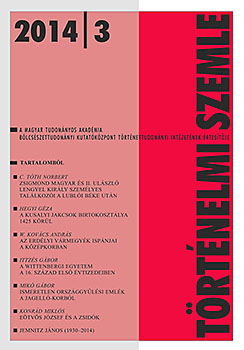Eötvös József és a zsidók
József Eötvös and the Jews
Author(s): Miklós KonrádSubject(s): Christian Theology and Religion, Jewish studies, Human Rights and Humanitarian Law, Governance, Political history, 19th Century
Published by: Magyar Tudományos Akadémia Bölcsészettudományi Kutatóközpont Történettudományi Intézet
Keywords: József Eötvös; Jews; Hungary; Jewish Congress of 1868–1869; The Emancipation of the Jews;
Summary/Abstract: The study, which examines the stance and policies of József Eötvös towards the Jews, basically deals with three topics: the role of Eötvös in the Jewish emancipation, his view on their conversion, and his behavior during the Jewish Congress of 1868–1869, which resulted in the split between the Neologs and the Orthodox. After the speech he had delivered in the Upper Chamber of the Hungarian parliament during the debate about an ultimately failed proposal which would have secured for the Jews those civic rights that were enjoyed by the non-noble inhabitants of the country, Eötvös published an article in the subject under the title of The Emancipation of the Jews. In this spirited apologetical writing Eötvös dismissed all requirements set as the preconditions of emancipation as untenable and nonsensical. Untenable, as it was impossible to demand whatsoever in exchange for a liberty that was due to all men; nonsensical, for no attachment could be expected from the Jews to a fatherland whose inhabitants refused to recognize them as its sons. In the matter of Jewish conversion, an important difference separated Eötvös from his contemporaries. While the latter tended to oppose to the Jewry not Christianity in general but rather the Christian Hungarians, Eötvös regarded the issue in strictly religious terms. He was convinced that the mission of the Jews had been concluded with the coming of Christ, and that the natural course of the Jews led towards Christianity. As, however, only a sincere conversion to the Christian faith could be desired, the Christians could only accelerate the coming of the long-awaited moment by living an exemplary life. As a Catholic, Eötvös hoped for the conversion of the Jews, but as a politician he did not urge it. As a man of living faith, and as a reform politician who proclaimed and fought for the freedom of religion, he completely disapproved of the idea of a secular reward for apostasy. In the course of the Jewish Congress, which aimed to establish the self-government of the Jewish denomination, Eötvös proved biased and applied a wrong tactics. Underestimating as he did the differences between the Neologs, who were ready to adapt Judaism to the „spirit of the age”, and the Orthodox, who opposed all religious innovations, he believed that the two parties would finally manage to work out a compromise during the congress. His hope was unfounded, however. After the congress, which ended with a split, he continued to hope the same unreasonably for the submission of the Orthodox. Since he rejected the way of octroy, there remained but one way: already after the death of Eötvös, the official recognition of the Orthodox regulation alongside the Neolog one by way of edict, and thus the organisational division of Hungarian Jewry.
Journal: Történelmi Szemle
- Issue Year: 2014
- Issue No: 03
- Page Range: 495-509
- Page Count: 15
- Language: Hungarian

